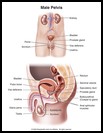
Undescended Testicle
What is an undescended testicle?
While a baby boy is developing in the womb, the tissue that becomes the testicles (also called testes) starts to develop in the abdomen, just below the kidneys. Normally, as the baby develops, the testicles move down a canal (called the inguinal canal) into the scrotum. The scrotum is the sac that holds the testicles. When one or both of the testicles do not move down into the scrotum, it is called undescended testicle(s). It is also called cryptorchidism, which means "hidden testicle."
How often does it occur?
Undescended testicles occur in about 3% of full-term baby boys. It is more common in premature babies.
What is the cause?
The causes are complex and not the same for every boy. It can be caused by problems with different hormones or developing tissue. A specialist in urology can tell you more about the cause of your son's condition.
Sometimes, one or both testicles do not descend because the testicle is not there at all. This can happen if there was a problem with the blood supply to the testicle(s) while the baby was developing and the testicle(s) never formed.
What is the treatment?
After the baby is born, most undescended testicles will continue their normal descent. Most of the time, the testicle(s) will move into place naturally by the time your son is 6 months old. After 6 months, it is unlikely that they will descend on their own.
If your child is older than 6 months, your healthcare provider will refer you to a urologist. There are 2 types of treatment: surgery and hormone therapy. Surgery is advised when the testicle has not descended very far. Hormone therapy may be best when the testicle has descended part way, but is not yet out of the abdomen.
What are the complications?
Some boys who have one undescended testicle will have fertility problems when they grow up. The cause for this is unknown. It may be because the tissue in an undescended testicle changes when it does not descend normally. These tissue changes cause the body to make less sperm. It is not known if treatment before 6 months of age helps to improve later fertility.
Boys who have had an undescended testicle also have an increased risk of hernias, urinary tract problems, and testicular cancer. Cancer is rare (only 1 in 2000 will develop testicular cancer).
If your child also has problems with his penis, your healthcare provider may send your child to a specialist in genetics.
When should I call my child's healthcare provider?
Call if:
- The testicle(s) has not descended by 6 months of age.
- You have other concerns or questions.

